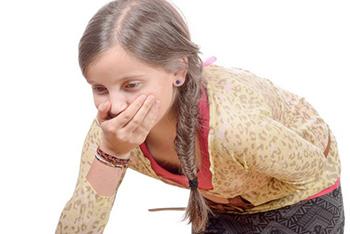Vomiting
- Vomiting reflex
- Causes
- Vomiting in children
- Symptoms
- Signs of a serious condition
- Complications of vomiting
- Treatment
- First Aid
- «Filtrum» against vomiting
- Vomiting prevention
Intensively contracting stomach muscles, accompanied by releasing its contents through the mouth, or vomiting, is a reflex protective process. It is necessary to cleanse the body of excess toxic substances. However, there is also pathological vomiting, not associated with getting rid of toxins.
Vomiting can be single, if a harmful substance entered the body with meal. A repeated symptom is often associated with various concomitant diseases. Frequent vomiting can cause dehydration and lost necessary salts, which is dangerous for life.
Vomiting reflex
The vomiting center is located in the brain. Along the nerve pathways, it receives signals from internal organs (pharynx, digestive organs, cardiovascular system, bile ducts, mesenteric vessels). One of its areas reacts to the chemicals found in the blood. Vomiting can also cause irritating other nerve centers, for example, an unpleasant odor.
The vomiting center analyzes these signals and transmits impulses to the muscles of the abdominal wall, stomach and others participating in a complex vomiting act. The role of substances called neurotransmitters in spreading such impulse is great. These are dopamine, serotonin, histamine, endogenous opiates and others. Many modern anti-emetic drugs influence precisely these mediators and their receptors.
Causes
Vomiting is really not a disease, but only serves as one of the symptoms of various pathologies:
- infections: viruses and bacteria (staphylococcus, salmonella and others) produce into the patient's blood toxins stimulating vomiting center);
- drig side effects (digoxin, euphyllin, cytostatics);
- acute gastritis;
- disordered normal meal passage out from the stomach to the 12-colon with ulcer disease, tumor, Crohn's disease;
- obstruction of the small intestine with hernia, inversion, invagination;
- negative psychogenic stimulation, severe stress;
- diseases of the nervous system (bad vestibular apparatus, Meniere's disease, increased intracranial pressure, meningitis, encephalitis, craniocerebral trauma, brain tumor);
- pregnancy due to hormonal and psychological disorders, less often with developing acute fatty liver;
- endocrine diseases (Addison's disease, strengthened thyroid function, diabetes with peripheral neuropathy);
- so-called visceral pain when stimulating receptors of the myocardium, gallbladder, peritoneum, pancreas (pancreatitis, cholecystitis, bile stasis, appendicitis, renal colic);
- radiation sickness or radiotherapy courses;
- more rare causes of vomiting are heart attack, pneumonia, severe dry cough, septic condition, bulimia, chemotherapy for cancer.
Vomiting in children
Sometimes it is challenging to distinguish vomiting from regurgitation, which is often observed in infants. Regurgitation happens immediately after feeding, and the volume of foood released is small; regurgitation "fountain" is atypical.
- Strong stream vomiting in the first 2 - 3 months of life can be a sign of pyloric stenosis - the place of stomach turning into the duodenum. The treatment is only surgical.
- If vomiting is combined with pain, the child constantly cries, and there are signs of blood in its stool, this can be a manifestation of intussusception of the intestine. The disease requires a surgeon's advice.
- If the child suffers also from vomiting and diarrhea, this is a symptom of a viral infection. If this condition lasts more than a day, the baby can get developing dehydration. It is combined with dry oral mucosa, absence of sweating in the axillary and inguinal areas, eyeball retraction, weak crying, low muscular tone. If the symptoms appear, consult the doctor immediately.
Symptoms
Before a vomiting, nausea is often observed. It is believed to be associated with irritated nerve center, but to a lesser extent.
With the urge to vomit, the muscles of the diaphragm, abdomen and thoracic wall contract. In the future, the circular muscles of the esophagus relax, and pressured meal quickly goes out through the mouth. In this case, the person takes a necessary pose.
At the same time, the symptoms are possible to develop:
- excessive salivation;
- cardiopalmus;
- fever;
- urge to stool.
With repeated vomiting, extreme metabolic and internal organ disorders happen:
- thinning teeth enamel with permanent damaging stomach with acid contents;
- reddening neck and face skin due to rapidly increasing pressure in the chest cavity during vomiting and disordered venous outflow from the upper body;
- weight loss, muscle atrophy, dry skin, brittle hair and other manifestations of nutritional deficiencies;
- dehydration with loss of intracellular fluid;
- decreasing content of potassium and sodium in the blood, increasing blood alkaline reaction;
- damading esophagus and stomach, for example, Mallory-Weiss syndrome, which can be complicated by bleeding.
Signs of a serious disease
Vomiting is a pretty common symptom and does not always require immediate treatment. However, there are situations when an urgent doctor`s consultation is needed:
- duration of symptoms is more than 1 day;
- suspected food poisoning;
- vomiting is accompanied by severe headache and / or neck bending disorder;
- vomiting is accompanied by severe pain in the abdomen;
- it does not help the patient.
Another reason for urgent seeking medical help is appearing bloody vomit, while:
- a large amount of light blood can be released;
- the patient spits out clots of a darker color;
- the patient emits a substance similar to the coffee grounds.
Bloody vomiting usually accompanies peptic ulcer disease or rupture of varicose veins of the esophagus. It also occurs in the breakdown of a cancerous tumor of the stomach. This condition often features weakness, dizziness and requires the patient to be immediately hospitalized.
Complications of vomiting.
The most typical complication associated with vomiting is dehydration. It is accompanied by the signs:
- dry mouth;
- muscle weakness, convulsions;
- darkening and decreasing urine;
- headache;
- confused consciousness.
This complication is especially dangerous for babies, since their bodies contain less liquid. When there is vomiting and symptoms of dehydration, the child should be immediately provided with medical help.
One of the main complications of recurring vomiting is a deficiency of nutrients. In this case, patients complain of weakness, fatigue, dyspnea, weight loss.
Treatment
To eliminate vomiting, treat the causing disease and also fill the deficiency of fluids and salts in the body. To do this, take special saline solutions for rehydration, which you can buy in the pharmacy. In severe cases, intravenous fluids and salts are prescribed. When vomiting, drugs from the group of antiemetics (antiemetic) are prescribed.
To lower the load on the digestive organs, the doctor can prescribe enzymatic remedies, for example, Micrasim.
When vomiting, refuse from rough, hard, fatty, spicy or other irritating food. Give up to consume dairy products in the first two days.
First aid
In case a person starts vomiting, take the measures:
- lye the patient on his/her side with a raised head and chest, put a clean bowl or bucket next to the bed;
- If the patient is unconscious, ensure him/her avoiding turning head to the back so that vomit do not enter the respiratory tract, so do not leave the sufferer alone;
- after vomiting, the patient drinks a glass of warm water with a teaspoon of baking soda dissolved in a mouth to rinse the mouth;
- dry the patient`s lips and face with a clean cloth;
- if a bloody vomiting happens, make a cold compress on the area of the lower part of the sternum and xiphoid process or give the patient small ice pieces for swallowing;
- Call for a doctor immediately if vomiting occurs.
Filtrum against vomiting
The drug "Filtrum" stimulates adsorbing toxins on its surface in the stomach and intestines. Therefore, it is used in medicine for the prevention and treatment of vomiting caused by endogenous or exogenous intoxication.
"Filtrum" will help stop vomiting caused by:
- food or alcohol poisoning;
- household intoxications;
- acute infectious diseases;
- side effects from a recently taken medication;
- metabolic disorders, for example, uremia (kidney failure).
"Filtrum" can be taken by children, reducing the dose according to the instructions, as well as by pregnant women, including when vomiting caused by toxicosis.
Prevention of vomiting
To reduce the likelihood of appearing symptom, influence the cause of the disease.
In addition, vomiting can be provoked by:
- excessive drinking;
- binge eating;
- migraine;
- work outs after having meal;
- strong emotional stress;
- having too hot or spicy meal;
- lack of sleep.
Following healthy lifestyle reduces the likelihood of vomiting. To avoid viral or bacterial infections causing intoxication, follow personal hygiene, wash hands before meals, have fresh meal only.
Important: Before using, read the instructions or consult your doctor.












